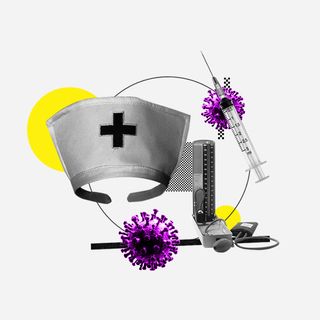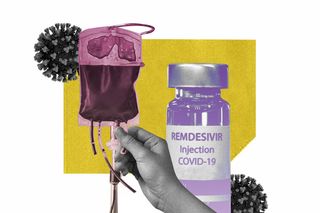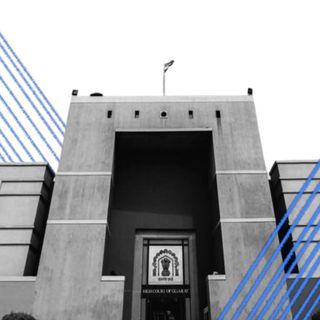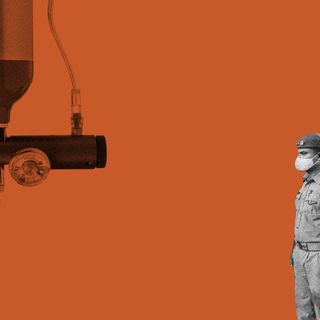
Remdesivir, Plasma Therapy Are Not The Best Treatments for Covid19. So Why Are Indians Desperate To Procure Them?
A mixture of panic, preconceived notions about India’s healthcare system, and a lack of guidance from public health officials has led to a surprising demand for non-essential drugs.

In India’s second wave of the Covid19 pandemic, gold is a vial of broad-spectrum antiviral medication known as Remdesivir. Every day, people post thousands of requests for the drug on social media; friends, family, and well-wishers race to procure it for loved ones at risk of dying. Several news reports document arrests of individuals attempting to sell the drug (or its fake versions) on the black market. There have also been several controversies and allegations involving members of political parties hoarding the medication.
However, Remdesivir is not a life-saver. A large World Health Organization (WHO) trial proved Remdesivir had little or no impact on Covid19 patients’ survival. What Remdesivir does is inhibit viral load, which is the amount of virus in an infected person’s blood, and reduces hospital stay. This helps the healthcare system cope with more than 3 lakh Covid19 cases per day, keeping beds available during a massive bed shortage. Yet, the drug is a secondary Covid19 therapy, best used for individuals living with mild-to-moderate Covid19. Convalescent plasma, another popular therapy, has also been disproved as an effective Covid19 treatment by the large PLACID clinical trial.
This begs the question — why are Indian doctors prescribing both in such large numbers, and why are people desperately attempting to source them?
“Because of this desperation to do something other than doing nothing,” Dr. Lancelot Pinto, a pulmonary disease specialist at P.D. Hinduja Hospital, Mumbai. “Even if, for argument’s sake, these drugs did have a role [in saving a life], the logical thought process would be to give them early to individuals with the highest risk of deterioration. For example, an older person with a few comorbidities who comes in with a fever that’s lasted two days should get it first, before the inflammatory phase kicks in and they start getting worse. Unfortunately, that’s not the case now — out of a sense of desperation, [doctors] try everything because people are dying.”
Related on The Swaddle:
The Second Wave: A Doctor Who Has to Choose Who Gets a Ventilator Says “Everybody’s Got Covid Now”
Mass panic around a mutating disease that doesn’t have a set treatment protocol makes trying everything sound almost sensible. “We have not received any formal training for this — no one has received any formal training on this because there is none. All we have are government guidelines, which constantly change as newer Indian Council of Medical Research (ICMR) studies & reports turn up every few months,” says Dr. Siddhi Chaudhari, a medical officer at a Covid19 healthcare facility in Mumbai. “So whatever you see in your field experience working for people — if you believe that’s working, you prescribe it.”
“For a disease in which most people recover, sheer chance would result in a proportion of patients getting better after receiving therapies such as Remdesivir and plasma. And if doctors see a patient recover via one therapy, they will never deprive any other patient of that therapy,” Dr. Pinto adds.
Amid the clutter of drugs still classified as investigational, there is one that works for sure: dexamethasone, a widely available and inexpensive steroid that helps reduce inflammation in severe Covid19 cases. In fact, WHO Director-General Tedros Ghebreyesus stated that dexamethasone is the only effective drug against severe Covid19. Supply matches demand in this case, which is fortunate for doctors and patients sourcing the drug. Some doctors also believe that Remdesivir, in collaboration with dexamethasone, is a winning combination. “Remdesivir is not the main drug, but when used with steroids at the right time, it cuts short the prolonged recovery period of patients in the first 10 days of illness,” says Dr. Nishant T, who has been working with Covid19 patients. “We had seen many patients recovering well within the five-day course of Remdesivir plus steroids. When Remdesivir was not even launched, we had treated patients solely on steroids, but the recovery takes a longer time.”
However, the clamor for Remdesivir and plasma therapy on social channels creates an echo chamber, making people believe that both are the most viable life-saving options available. “Many people believe certain drugs save lives because the doctor wrote it down between five other injectables — and they simply don’t have any other source of information,” Dr. Chaudhari adds. “If they can’t find a drug, they believe that not being able to use that drug is the reason their loved ones died — which is not always true.”
One major assumption that allows Remdesivir’s value to inflate is how much it costs. “In India, treatment itself is a privilege,” says Dr. Anindya Kar, the chief medical officer at the Advanced Neuropsychiatry Institute, Kolkata. “So a lot of people assume that the best treatment involves expensive treatments, expensive doctors and expensive hospitals.” A single vial of Remdesivir will cost anything between Rs. 2800 to Rs. 4000, and up to Rs. 50,000 in the black market. Plasma treatment costs between Rs. 15,000 to Rs. 20,000. In comparison, dexamethasone costs Rs. 5-8 per strip of tablets.
“There is a perception that something that’s very expensive is expensive for a reason. And therefore, it’s more likely to be beneficial than something that’s really inexpensive,” Dr. Pinto adds.
These misconceptions are heightened as the Indian population’s mental health frays during the second wave.
“In any kind of crisis, whether it is a pandemic or a disaster, this kind of stocking up and panic buying comes down to an individual’s perception of the crisis, a fear of the unknown, uncertainty, and coping behavior. The last one is important here, as coping behavior is a means to relieve anxiety and regain control over the crisis,” Dr. Kar says. Just as the first wave of the Indian Covid19 crisis saw mass panic-influenced stocking of soap and sanitizers, the second wave is seeing attempts to hoard Remdesivir.
Panic is also not exclusive to laypeople; doctors can fall victim to it, too. “My own friend from the medical fraternity had a family member who contracted Covid19. The case was mild — not severe at all. But since she knew there was a lack of Remdesivir, she too began wildly searching for it,” Dr. Chaudhari says.
Related On The Swaddle:
Effective Covid Vaccine Will Be Meaningless in India Without a Mass Immunization Strategy
Relieving this anxiety is usually a doctor’s responsibility. In an ideal, non-pandemic situation, a doctor takes the patient through several treatment options, explains all of them, and allows the patient time to make an educated choice. In a pandemic, doctors just do not have that time. “Although I don’t condone it, this is unfortunately how it is,” Dr. Pinto says. “Doctors who go to meet Covid19 patients are double-masking, and holding long conversations in that setting is exhausting because it’s difficult to breathe. Second, health care decisions in these situations are made by families who don’t have the patient in front of them, so they’re panicking. In this case, due to fear and paranoia, families usually tend to leave treatment up to the doctor. They say, ‘We’ll do whatever it takes. And we’ll do whatever you want,’ if they can afford it.”
Ideally, public health systems and the government would step in to clear misconceptions and encourage good medical practices. The Maharashtra and Gujarat state governments have made statements about the misuse and overuse of Remdesivir. The central government’s Covid19 task force has publicly stated Remdesivir is an investigational drug and reserved for use by Covid19 patients on oxygen. However, these statements are not enough, even when reported by large news dailies, because they are scattered and inadequate; lawmakers have created no robust campaigns that dispel Covid19 myths for citizens. Instead, their efforts to stem the Covid19 misinformation wave involve restricting Twitter posts about the severity of the second wave.
Plus, the severe mismanagement of the Covid19 second wave by the Indian government, several reports of Covid19 vaccine mismanagement, and the Health Ministry’s endorsement of non-allopathic practices on both government and private fronts, have further lowered public trust in the government’s health advice.
On a more micro level, doctors believe that hospital management is equally responsible for public health education efforts that help mitigate panic. “Right now, doctors are so overwhelmed. We see a hundred patients every single day and we have to informally counsel them too. I’m not a counselor, I’m not a psychologist, I’m not a psychiatrist, but we have to help,” Dr. Chaudhari says. “So even if the hospital hires a public health communicator or a psychologist who can disseminate this authentic information, that is a massive help. That responsibility falls on the management.”
As Gilead Sciences, the U.S. manufacturers of Remdesivir, pledge to reduce the shortage of the drug in India via providing technical assistance to expand production and donating 4.5 lakh vials, there is a possibility that the country will have a stable supply of Remdesivir to meet the current demand. However, the current panic around Remdesivir is an important public health lesson — about the consequences of panic and the inability to influence public health literacy by those in charge.
Dr. Chaudhari adds, “Via social media, we are trying to create an artificial public health system because you got to do your best with whatever that is there.”
Aditi Murti is a culture writer at The Swaddle. Previously, she worked as a freelance journalist focused on gender and cities. Find her on social media @aditimurti.
Related


Student Who Missed Exam Due to Depression Should Be Given Second Chance: Gujarat HC
